Interview with S A Chakraborty (CITY OF BRASS)
S. A. Chakraborty is the author of the critically acclaimed and internationally best-selling The Daevabad Trilogy. Her work has been nominated for the Locus, World Fantasy, Crawford, and Astounding awards. When not buried in books about thirteen-century con artists and Abbasid political intrigue, she enjoys hiking, knitting, and re-creating unnecessarily complicated medieval meals. You can find her online at www.sachakraborty.com or on Twitter and Instagram at @SAChakrabooks, where she likes to talk about history, politics, and Islamic art. She lives in New Jersey with her husband, daughter, and an ever-increasing number of cats.
Hi Shannon, welcome to the Hive! It’s so good to have you here!
Thank you for having me! I’ve enjoyed following this interview series.
Congratulations on your completed trilogy! How does it feel to have all three books out there in the wild? Are you sad to let this world and your characters go?
Thanks! Honestly, my emotions have been all over the place. I’ve been working on the Daevabad Trilogy for over a decade, nearly my entire adult life, and these fictional characters have been living in my brain through job changes and relocations, marriage and parenthood. It’s hard to let them go! But for however sad and wistful I’ve been, I mostly feel very, very satisfied. Writing these books put me through the wringer, but I’m incredibly proud of the conclusion—and more than that, I feel honored to see their reception among readers.
You have absolutely gorgeous covers for The Daevabad Trilogy, what was your reaction when you first saw the initial cover designs for each book? (We would have squealed with delight!) And did you have this design style in mind, or did the cover artist take you by surprise?
I have been completely blessed when it comes to covers, for both the US and UK designs. I had a lot more input when it came to the US version which had a bit of an “arty” more abstract feel; whereas the UK covers are pure epic fantasy. So it was very nice to have both options!
Where do you fall on the intense-planning / organic-plot-development scale?
Unfortunately for my time-management plans, I fall on the “organic-plot-development” side. I like to approach scenes with the idea that I know my characters, I know my world…so how would they react if x y z happened? I’ll aim for certain end points or wider arcs, but I’m a big believer in letting yourself chase down story ideas as they come while you write and rewrite. I think it makes plots feel more natural and gives you a more character driven story.
What are your favourite kind of female characters to write?
The same as my favorite characters to write from any part of the gender spectrum: rich, messy, complicated and nuanced ones. I don’t really like to hold myself to the responsibility of wondering what kind of female characters I “should” write; I’m a woman writing in a genre that’s been dominated by male authors (if not in reality because women have been cleaning up in awards lately, than in popular perception) with books that are often full of misogyny, so as for me? I’m going to write what I want. And I want to see mothers who love their children and have ambitions. I want to see older women. I want to see women fall in and out of love and center their own desires. I want to see a rich tapestry of female friendships and mothers and daughters and mentors and scholars.
The Middle Eastern setting of your trilogy is quite a richly cultured setting to delve into. What sparked your imagination to set your book in this world? What was your world-building process?
It wasn’t meant to be a trilogy at first—the first book actually resulted from a world-building that I never intended to show a soul. I’m a big history buff and with The City of Brass I wanted to recreate some of the stunning worlds I’d read about while also exploring traditional beliefs about djinn. Djinn are said to be intelligent beings similar to humans, created from smokeless fire and living unseen in our midst—a fascinating, albeit slightly frightening concept, this idea of creatures living silently among us, dispassionately watching the rise and fall of our various civilizations.
It’s also a concept that offers a great opportunity to imagine how djinn might have built their world, mimicking the ways of their human neighbors. So in The City of Brass, there’s a djinn version of Baghdad’s great library, filled with the ancient books humans have lost alongside powerful texts of magic; they battle with weapons from Achaemenid Persia (enhanced by fire of course); the medical traditions of famed scholars like Ibn Sina have been adapted to treat magical maladies; dancers conjure flowers while singing Mughal love songs; a court system based on the Zanzibar Sultanate deals justice to merchants who bewitch their competitors… not to mention a cityscape featuring everything from ziggurats and pyramids to minarets and stupas. I also pushed a little further with the idea of the unseen, imagining a world of enchanted creatures created from other elements passing through ours: marid raising rivers into great serpents, peris whipping the air into tornados, djinn conjuring maps of smoke and racing birds of fire. I then set short stories in this world, fleshing out the history and various characters, and when I hit upon Nahri, the whole first book really came into focus.
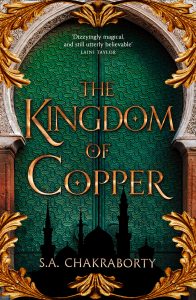 Since this is our Women in SFF month, who were the women in SFF (or beyond) that influenced or inspired you? (Authors and/or characters!)
Since this is our Women in SFF month, who were the women in SFF (or beyond) that influenced or inspired you? (Authors and/or characters!)
N.K. Jemisin. I was a bit late to fantasy, but I remember picking up The Hundred Thousand Kingdoms when it first came out and being immediately struck in two way: one, that I didn’t know we could have books like that. Two, that I wanted to write books like that. Following the arc of her career has been wondrous. I love how each new trilogy/duology just goes in a such a different direction while leveling up in astonishing degrees of creativity.
Characters? Oddly enough, probably a lot of the women in Buffy the Vampire Slayer. I was young when it came out and it was my first introduction to a female-centered paranormal fantasy in which a girl was the Chosen One (and I also really liked Willow; give it up for nerdy witches).
Ah Willow was my favourite, too!
What’s a good SFF book (written by a woman) you’ve read recently?
The vast majority of the SFF books I read are by women, but a particularly excellent one is Black Sun by Rebecca Roanhorse. She’s one of my favorite writers right now and one of the most talented creator in our field. Black Sun is her first foray into epic fantasy and the world that she’s built is so wondrously drawn you feel like you could just sink right into it. It’s an incredibly detailed and atmospheric fantastical interpretation of the pre-Columbian Americas unlike anything I’ve ever read before. The characters are amazing and the struggles it portrays between duty and family and faith…I loved it.
If you could co-write or co-create a series, which author would you choose to work with and why?
Strangely enough, I haven’t really considered co-writing and don’t know that I would want to, particularly at this point in my career. I’m still growing into my own messy, chaotic process of writing that I don’t think it would be fair to subject another person to it!
What piece of advice have you found the most useful during the process of writing?
To finish the work. It’s so easy to get hung up on certain scenes and send yourself spinning into despair. Jot down a couple notes about what you want the scene or chapter to accomplish, what’s plaguing you, etc, and then move on. You can often see the grand arc of a book and where the pieces need to go better once it’s done, even if the prose is drafty.
What do you most love to do, other than writing?
I love to cook. It completely pulls me away from work, it’s fun and creative, and you get to eat something delicious at the end. I like mixing up different cuisines and ingredients to make something new and delving into historical recipes. This past year after binging the Great British Bake-off with my family, I got really into baking which had been one of my weaknesses. Now I reward myself with a new baking project after meeting deadlines.
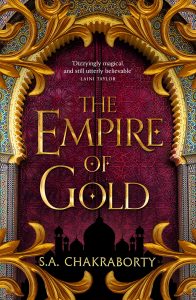 We know that The Empire of Gold has only just been released, but what can readers expect to see from you next, Shannon?
We know that The Empire of Gold has only just been released, but what can readers expect to see from you next, Shannon?
Pirates! I’m heading down the proper historical fantasy adventure road with a trilogy about retired pirates who get pulled into one last heist when an ex-Crusader starts hunting after them. It takes place in the medieval Indian Ocean which is a world and era I really enjoyed studying in university so it will be nice to bring it back to life a bit from the point of view of some older female characters who aren’t as worried with saving the world as the characters in the Daevabad Trilogy were! I also wanted to make this a book about motherhood. We don’t see enough mothers going off on magical adventures, or frankly any adventures in fantasy, and I wanted to offer my own spin on it.
That sounds amazing!
Lastly, and of course we save the most important question for last! What is your favourite fantastical creature? Which would you ride into battle on?
Talking cats of any variety. I am unabashed cat lover (like I’ve got cat towels and tea cups and home décor, alright?) and I always enjoy a good magical cat, especially if they’re the wily, sarcastic sort—Aslan was far too much of a drab. And if I need to ride into battle, I’m going to pick my own flying shedu from my books.
I’d pick Jiji over Aslan any day.
Thank you, Shannon.
You’re welcome. Thanks for having me!
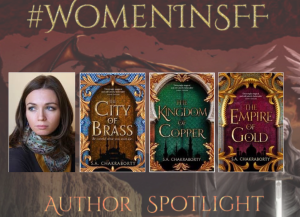

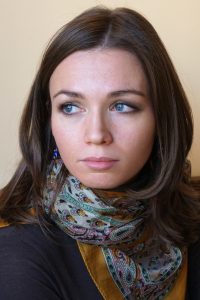
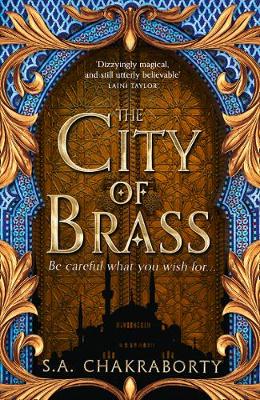
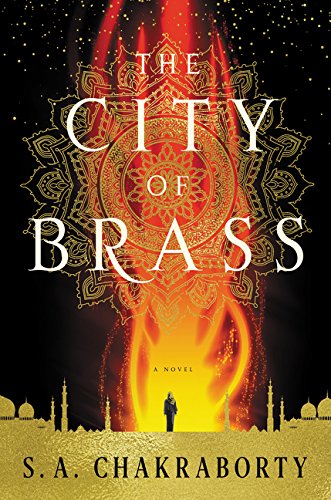
Oh wow, her new series sounds amazing! I loved the Daevabad Trilogy, I can’t wait to follow her through the rest of her writing career. 🙂